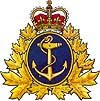
One of the many services provided by Fisheries and Oceans Canada/Canadian Coast Guard is of course Search and Rescue. There are dedicated ships, small craft and aircraft across Canada, with specialized crews, whose sole purpose is to respond to life threatening situations at sea. The link below will provide a quick primer on the Canadian Coast Guard's mandate with regards to SAR.
http://www.ccg-gcc.gc.ca/eng/CCG/Search_Rescue
With that said, the Canadian Forces are the main federal authority charged with Search and Rescue across Canada. There are many differences between SAR services provided by the Coast Guard and the Forces. For one, the Canadian Forces conduct inland SAR Ops across Canada. This is done through 3 main Joint Rescue Coordination Centres (JRCCs). These are located in CFB Halifax, NS, CFB Trenton, ON and CFB Esquimalt, BC. There are also 2 Rescue Sub-Centres located in Québec City, QC and St.John's, NL.
www.jrcchalifax.forces.gc.ca/JRCC_home_E.htm
http://www.pacific.ccg-gcc.gc.ca/sar/jrcc/index_e.htm
http://www.airforce.dnd.ca/8wing/squadron/jrcc_e.asp
The Joint Rescue Coordination Centres (JRCC) coordinate and carry out air and marine search and rescue operations in Canada and its adjacent waters. The Centres also carry out land-based search and rescue operations at the request of the responsible authorities. They are manned by both Forces and Canadian Coast Guard personnel.
There is a dedicated trade within the Canadian Forces which is SAR Tech (MOC 131). It is a very small trade with an exclusive membership. There are currently only 130 SAR Techs serving all of Canada. Their motto: "That Others May Live", pretty much says it all. The training and qualifications required to become a SAR Tech, make Airborne school look like a walk in the park. People will frequently e-mail us, asking for information on becoming a SAR Tech with the Coast Guard. Well kiddies, there ARE NO SAR Techs in the Coast Guard. If you want to wear that particular distinction on your jumper, you had better enlist with the Canadian military.
SAR Techs are highly trained specialists who provide on-scene medical attention and rescue for aviators, mariners and others in distress in remote or hard to reach areas.
They are trained in advanced trauma life-support, land and sea survival, rescue techniques from helicopters, precision parachuting, diving, mountain climbing and rappelling.
In the air, they act as spotters, providing medical care during medical evacuation flights, direct the dropping of equipment and supplies by parachute and parachute and hoist from the planes and helicopters. On the ground, they render on-site medical care to casualties, organize and lead ground search teams and perform mountain rescue operations to assist and recover casualties.
They are trained to operate boats and to perform both surface and underwater rescues using scuba gear. They are trained as survival experts under all Canadian climatic and terrain conditions including on land, at sea, in the Arctic, on mountains and on glaciers. They are also trained to communicate with over-flying Aircraft by use of radios, flares, smoke, ground and hand signaling devices and other methods. The only military personnel who outshine these lads, are the American Combat Rescue Specialists, who practise all the aforementioned disciplines and are also highly trained in Combat Arms.
With a combined responsibility of 15,540,000 square kilometers (Canada's landmass, territorial waters and mid-ocean sections of the Atlantic and Pacific) and the challenges of terrain and climate, search and rescue in Canada is a demanding and daunting task. Yet it is one that our SAR Techs take on with aplomb and dedicated professionalism.
http://www.airforce.forces.gc.ca/site/athomedocs/athome_2_e.asp
Following the release of the Hollywood movie "The Guardian", we were deluged with e-mails from young lads who: "want to be the guy that jumps out of the helicopter". For as much as I admire those who serve in the U.S. Coast Guard as rescue swimmers, they cannot hold a candle to our own SAR Techs. Besides, I think the romance of that particular job would wane quickly, the first time they realized that they would often not be alone in the water. (Cue the sinister cello music...).
Search and rescue in Canada is conducted on a variety of levels. There are a slew of municipal organisations that one can volunteer to get involved with, your provincial EMO (Emergency Measures Organisation), even the Canadian Coast Guard Auxiliary has it's Marine Search and Rescue - Volunteers program, which recruits volunteers to help the Canadian Coast Guard and the Canadian Forces in marine search and rescue operations, and to promote safety awareness in Canadian waters through the following activities:
- demonstrating the use of marine safety equipment- developing safe boating practices
- conducting inspections of pleasure craft and small fishing vessels in order to ensure that the necessary safety equipment is on board.
http://www.ccga-gcac.org/
True, the life of a rescue specialist can be seen as one full of glamour. The reality however is somewhat different. It takes very special individuals who are willing to put their life on the line every day, not for the fame, or the adulation, because there are none. But simply because somewhere... someone needs them. It is probably the most selfless career a person can embark on.
http://www.ccg-gcc.gc.ca/eng/CCG/Search_Rescue
With that said, the Canadian Forces are the main federal authority charged with Search and Rescue across Canada. There are many differences between SAR services provided by the Coast Guard and the Forces. For one, the Canadian Forces conduct inland SAR Ops across Canada. This is done through 3 main Joint Rescue Coordination Centres (JRCCs). These are located in CFB Halifax, NS, CFB Trenton, ON and CFB Esquimalt, BC. There are also 2 Rescue Sub-Centres located in Québec City, QC and St.John's, NL.
www.jrcchalifax.forces.gc.ca/JRCC_home_E.htm
http://www.pacific.ccg-gcc.gc.ca/sar/jrcc/index_e.htm
http://www.airforce.dnd.ca/8wing/squadron/jrcc_e.asp
The Joint Rescue Coordination Centres (JRCC) coordinate and carry out air and marine search and rescue operations in Canada and its adjacent waters. The Centres also carry out land-based search and rescue operations at the request of the responsible authorities. They are manned by both Forces and Canadian Coast Guard personnel.
There is a dedicated trade within the Canadian Forces which is SAR Tech (MOC 131). It is a very small trade with an exclusive membership. There are currently only 130 SAR Techs serving all of Canada. Their motto: "That Others May Live", pretty much says it all. The training and qualifications required to become a SAR Tech, make Airborne school look like a walk in the park. People will frequently e-mail us, asking for information on becoming a SAR Tech with the Coast Guard. Well kiddies, there ARE NO SAR Techs in the Coast Guard. If you want to wear that particular distinction on your jumper, you had better enlist with the Canadian military.
SAR Techs are highly trained specialists who provide on-scene medical attention and rescue for aviators, mariners and others in distress in remote or hard to reach areas.
They are trained in advanced trauma life-support, land and sea survival, rescue techniques from helicopters, precision parachuting, diving, mountain climbing and rappelling.
In the air, they act as spotters, providing medical care during medical evacuation flights, direct the dropping of equipment and supplies by parachute and parachute and hoist from the planes and helicopters. On the ground, they render on-site medical care to casualties, organize and lead ground search teams and perform mountain rescue operations to assist and recover casualties.
They are trained to operate boats and to perform both surface and underwater rescues using scuba gear. They are trained as survival experts under all Canadian climatic and terrain conditions including on land, at sea, in the Arctic, on mountains and on glaciers. They are also trained to communicate with over-flying Aircraft by use of radios, flares, smoke, ground and hand signaling devices and other methods. The only military personnel who outshine these lads, are the American Combat Rescue Specialists, who practise all the aforementioned disciplines and are also highly trained in Combat Arms.
With a combined responsibility of 15,540,000 square kilometers (Canada's landmass, territorial waters and mid-ocean sections of the Atlantic and Pacific) and the challenges of terrain and climate, search and rescue in Canada is a demanding and daunting task. Yet it is one that our SAR Techs take on with aplomb and dedicated professionalism.
http://www.airforce.forces.gc.ca/site/athomedocs/athome_2_e.asp
Following the release of the Hollywood movie "The Guardian", we were deluged with e-mails from young lads who: "want to be the guy that jumps out of the helicopter". For as much as I admire those who serve in the U.S. Coast Guard as rescue swimmers, they cannot hold a candle to our own SAR Techs. Besides, I think the romance of that particular job would wane quickly, the first time they realized that they would often not be alone in the water. (Cue the sinister cello music...).
Search and rescue in Canada is conducted on a variety of levels. There are a slew of municipal organisations that one can volunteer to get involved with, your provincial EMO (Emergency Measures Organisation), even the Canadian Coast Guard Auxiliary has it's Marine Search and Rescue - Volunteers program, which recruits volunteers to help the Canadian Coast Guard and the Canadian Forces in marine search and rescue operations, and to promote safety awareness in Canadian waters through the following activities:
- demonstrating the use of marine safety equipment- developing safe boating practices
- conducting inspections of pleasure craft and small fishing vessels in order to ensure that the necessary safety equipment is on board.
http://www.ccga-gcac.org/
True, the life of a rescue specialist can be seen as one full of glamour. The reality however is somewhat different. It takes very special individuals who are willing to put their life on the line every day, not for the fame, or the adulation, because there are none. But simply because somewhere... someone needs them. It is probably the most selfless career a person can embark on.
















No comments:
Post a Comment